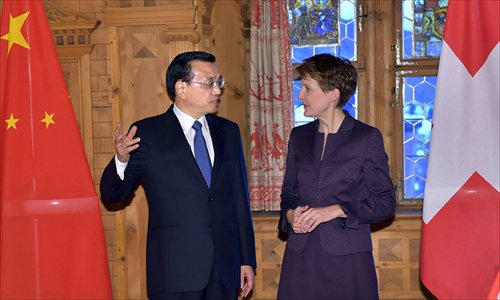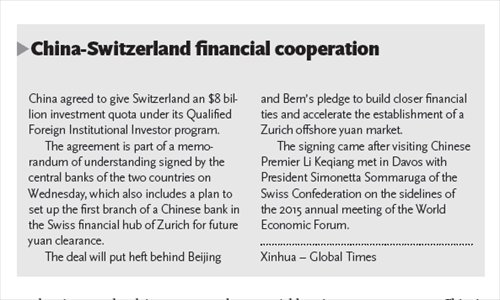
Chinese Premier Li Keqiang talks with President Simonetta Sommaruga of the Swiss Confederation on the sidelines of the 2015 annual meeting of the World Economic Forum in Davos on Wednesday. Photo: Xinhua

Graphics:GT
Economists said Thursday that China will maintain an annual growth rate of around 7 percent in the coming years, after Chinese Premier Li Keqiang said the country's economy is not headed for a hard landing.
China's GDP growth slowed to 7.4 percent in 2014, the slowest in 24 years. But the premier said early Thursday Beijing Time that the country's economy will not suffer a hard landing even though it faces downward pressures this year.
A 7 percent growth in China's economy produces an annual increase of $800 billion at current prices, an increase of 10 percent over five years ago, Li said in a keynote speech at a special session of the annual meeting of the World Economic Forum in Davos.
"We will move toward the path of reforms. This way we can shift gear without losing momentum and achieve medium-to-high-speed growth, and medium-to-high-level development," he said.
According to Li, structural reforms will include liberalization of the services sector, promoting entrepreneurship and innovation, protecting intellectual property rights and deepening capital markets.
Li's speech sent a positive signal on China's economic outlook, and emphasized both China's determination to deepen reforms and the country's willingness to strengthen cooperation with other economies in the future, experts said Thursday.
With a low debt ratio, high savings ratio and a nearly $4 trillion in foreign exchange reserves, China still has the potential to achieve a 7 percent growth rate in the coming years and continues to be a major growth engine for the global economy, Justin Lin Yifu, a professor at Peking University and former chief economist of the World Bank, was quoted by news portal ifeng.com as saying at a panel discussion of the World Economic Forum in Davos on Thursday.
"During the past year, Chinese policymakers implemented mini-stimulus measures, such as targeted reserve requirement ratio cuts, and deepened reforms to adjust to the 'new normal,'" Xu Hongcai, head of the Department of Information with the China Center for International Economic Exchanges, told the Global Times Thursday.
"China's growth has slowed a bit, but the quality and efficiency of the economy has improved, relying more on the services sector and domestic consumption," Xu said.
Ruan Zongze, vice president of the China Institute of International Studies, said Thursday that even a growth rate of "around 7 percent" is still within a reasonable range and higher than that of most economies.
"If China's economy continues to grow at 7 percent, it will drive the global economy's growth rate up a full percentage point," he said during a Thursday interview posted on the central government's website.
Addressing concerns over China's government debt risks, Premier Li said China will not have regional and systemic financial risks.
"China has taken effective measures to prevent potential debt and financial risks," he said. "The country's savings ratio, as high as 50 percent, will provide sufficient capital to support economic growth, while 70 percent of local government debt has gone toward financing infrastructure construction that could turn into assets," he said.
Li also noted that China would not implement monetary stimulus but instead focus on fine-tuning to keep the economy running within a reasonable growth range.
At an earlier panel in Davos held Wednesday, Zhou Xiaochuan, China's central bank governor, also said the central bank does not intend to inject too much liquidity into the economy.
Chinese policymakers' comments lowered market expectations for broad-based monetary easing.
"Excessive credit will not help much in stimulating the real economy, but will lead to asset bubbles and pressure on the yuan's exchange rate," analysts with Minsheng Securities said in a research note on Thursday.
The note explained that economic uncertainty has made banks reluctant to lend despite broad-based monetary easing, while entrepreneurs have been cautious in borrowing to expand production given thin profit margins.
A proactive fiscal policy, with investments in infrastructure, will be more helpful in stabilizing China's economy, the note from Minsheng Securities has said.

